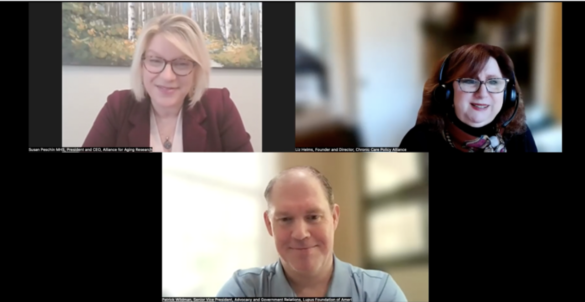On October 3, 2025, CCPA hosted a webinar, “Medicare in Transition: Drug Pricing Negotiation, Open Enrollment Essentials, and Legislative Updates.” It was moderated by CCPA Founder and Director Liz Helms, and featured panelists Patrick Wildman, Senior Vice President, Advocacy and Government Relations of the Lupus Foundation of America and Susan Peschin, President and CEO of the Alliance for Aging Research. The webinar helped patients, caregivers, and advocates understand and prepare for Medicare changes in 2026.
Medicare and Prescriptions
The webinar began with Patrick Wildman discussing reforms from the Inflation Reduction Act. These changes aim to reduce out-of-pocket costs for patients while negotiating prices for high-cost drugs.
Wildman highlighted key benefits, including a $2,100 out-of-pocket cap and the Medicare Prescription Payment Plan (“smoothing”), which allows beneficiaries to spread medication costs throughout the year. At the same time, he addressed challenges such as narrowed formularies, increased prior authorization requirements, cost-sharing issues, and plan incentives that may affect access and adherence.
He also discussed the Medicare Drug Price Negotiation Program (MDPNP) noting that while the program appears beneficial on the surface, questions remain about whether patients are truly benefiting and whether they have a voice in the negotiation process.
Open Enrollment
Next, Susan Peschin guided attendees through the upcoming Medicare open enrollment period, which runs from October 15 to December 7, 2025. Peschin provided practical steps to compare plans, reduce costs, and avoid mistakes. She emphasized the importance of reviewing formulary changes, understanding eligibility for cost-spreading programs, and confirming plan updates, sometimes requiring a call to the plan directly or reaching out to your state health insurance assistance program for additional support.
Telehealth Access and the Government Shutdown
Moving into a roundtable discussion, the panel explored the current uncertainty around the future of telehealth due to expired waivers and the impact of the government shutdown on patients. Telehealth has been a critical tool for older adults and caregivers, particularly for routine visits and chronic condition management. Peschin shared her personal experience as a caregiver to her mother with severe arthritis and dementia, noting that telehealth has been life-changing and made care far more accessible and less stressful. The panelists agreed that maintaining access remains a priority and encouraged participants to contact their members of Congress to push for solutions.
Common Medicare Scams and How to Avoid Them
In closing, participants were reminded to stay alert for fraud and scams targeting Medicare beneficiaries, and to take steps to protect personal information, including verifying that any communications from plans and providers are legitimate. Examples included reading the fine print in ads, avoiding “low-cost” schemes where patients receive equipment that is faulty or incurs hidden costs, and noting that Medicare will never call or text for your Medicare or Social Security number. All suspicious activity should be reported to 1-800-Medicare and/or your local aging agency.
Key Takeaways
- Patient perspective matters: Evaluating medications and programs should focus on real-world benefits for patients, not just cost.
- Plan review is critical: Even small formulary or tier changes can impact medication access.
- Stay informed and engaged: Utilize resources like MAPRx and the Alliance for Aging Research to navigate Medicare changes confidently.
- Collaboration strengthens advocacy: Sharing experiences and insights helps ensure policymakers hear the patient voice.
Navigating Medicare changes may feel complex, but informed patients and caregivers can take practical steps to maintain access, control costs, and protect their care.
For more information and resources, visit MAPRx.info and loweroutofpocketcosts.org, and you can view the complete webinar here.


